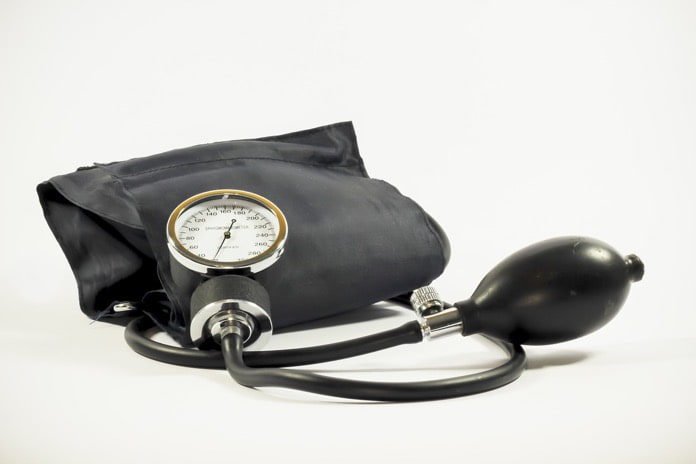In a follow-up analysis of the SPRINT study, investigators looked at the effects of intensive blood pressure control on the risk of chronic kidney disease.
As the heart pumps the blood around the body, it is at a certain pressure within the blood vessels.
Blood pressure measurement records two pressure levels: the systolic blood pressure (SBP) when the heart is contracting, and the diastolic blood pressure (DBP) when the heart is relaxed.
Normal resting blood pressure is a SBP of up to 120 mmHg and a DBP of up to 80 mmHg. If a person’s resting blood pressure is consistently higher than this, it may start to damage body organs and place the individual at an increased risk of heart disease, stroke, and kidney disease.
Antihypertensive medications are used to decrease blood pressure to reduce the risk of damaging body organs. SBP has been shown to be a more important cardiovascular disease risk factor than DBP.
However, the target level for SBP in blood pressure treatment is unclear.
There has been much research on this question, bearing in mind that target SBP levels may vary between different subgroups of patients, depending on whether they have other medical conditions.
In addition, any benefits of more intensive treatment need to be balanced against the potential side effects of a higher number and dosage of antihypertensive drugs.
The SPRINT Study (Systolic Blood Pressure Intervention Trial) set out to look at the effects of intensive SBP control (where antihypertensive medication was adjusted monthly to achieve a target SBP of less than 120 mmHg) versus standard SBP control (where antihypertensive treatment was adjusted monthly to achieve a target SBP of between 135-139 mmHg) on outcomes in patients who did not have diabetes or a history of previous stroke.
The trial was stopped early after about three years of follow-up because intensive SBP control resulted in a significantly greater reduction in heart attack, stroke, or death from cardiovascular disease.
However, there was a concern that intensive SBP control could affect kidney function, as filtration in the kidneys is highly dependent on hydrostatic pressure.
In fact, in the SPRINT Study, the intensive SBP treatment group had a 3.5-fold higher risk of developing signs of chronic kidney disease over the course of the study.
The investigators analyzed this subgroup of patients to better understand the effects of intensive SBP control on the kidneys.
They recently published their findings in the Annals of Internal Medicine.
The main SPRINT Study compared the effects of intensive SBP control versus standard SBP control in 9,361 participants at 102 clinical centers in the USA and Puerto Rico.
This subanalysis was performed on 6,662 of SPRINT participants who had no evidence of kidney disease at the start of the trial. Kidney health was measured by testing the glomerular filtration rate.
After three years, signs of chronic kidney disease occurred in 3.7% of the intensive control group, compared with 1% of the standard therapy group.
However, none of the participants who developed signs of chronic kidney disease progressed to end-stage kidney failure.
In addition, about 25% of those with chronic kidney disease in the intensive therapy group recovered their kidney function. Conversely, those in the intensive treatment group had only a 4.9% incidence of either a cardiovascular event (such as heart attack or stroke) or death, compared with 7.1% in the standard treatment group.
The researchers concluded that although intensive treatment increased the risk of chronic kidney disease, the significance of this was outweighed by the benefit of decreased cardiovascular events and all-cause mortality.
However, the long-term consequences of intensive SBP lowering on kidney function need to be established.
It will also be important for doctors to balance of the benefits of intensive SBP management with the potential side effects of increasing antihypertensive drugs in individual patients.
Written by Julie McShane, Medical Writer
Relevant topics that may be of interest to you:
- Could blood pressure drugs have potential as a medication for Alzheimer’s disease?
- The Blood Pressure Myth
- Effective Ways to Lower High Blood Pressure
- Targeting the Immune Cells to Treat High Blood Pressure
- Do Nitrate-Rich Vegetables Lower High Blood Pressure?
- Effects of Mediterranean Diet on Endothelial Function and Blood Pressure
- Does dietary nitrate help decrease high blood pressure?
- Can a home blood pressure monitor predict disease risk?
- Taking many pills for high blood pressure? One pill may be just as effective
Reference: Beddhu S, Rocco MV, Toto R, et al. Effects of intensive systolic blood pressure control on kidney and cardiovascular outcomes in persons without kidney disease. Ann Int Med. 2017;167:375-383. doi:10.7326/M16-2966



